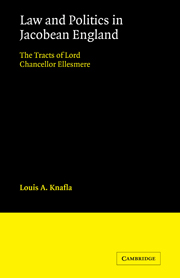Book contents
- Frontmatter
- Contents
- Preface
- List of abbreviations
- Notes on style
- Table of statutes
- Table of cases
- INTRODUCTION
- PART ONE LAW AND POLITICS
- I The Making of a Legal Mind
- II Kingship and the Problem of Sovereignty
- III Lords and Commons
- IV Reforming Privy Councillors: Crown Finances and the Administration of Government
- V The Problem of Law Reform
- VI The Clash of Jurisdictions: Central and Local Authorities, Secular and Ecclesiastical
- VII Les Enfants Terribles: Coke, Ellesmere, and the Supremacy of the Chancellor's Decree
- VIII The Provenance of Ellesmere's Tracts
- PART TWO ELLESMERE'S TRACTS
- Index of Persons and Places
- Index of Subjects and Terms
II - Kingship and the Problem of Sovereignty
Published online by Cambridge University Press: 05 January 2012
- Frontmatter
- Contents
- Preface
- List of abbreviations
- Notes on style
- Table of statutes
- Table of cases
- INTRODUCTION
- PART ONE LAW AND POLITICS
- I The Making of a Legal Mind
- II Kingship and the Problem of Sovereignty
- III Lords and Commons
- IV Reforming Privy Councillors: Crown Finances and the Administration of Government
- V The Problem of Law Reform
- VI The Clash of Jurisdictions: Central and Local Authorities, Secular and Ecclesiastical
- VII Les Enfants Terribles: Coke, Ellesmere, and the Supremacy of the Chancellor's Decree
- VIII The Provenance of Ellesmere's Tracts
- PART TWO ELLESMERE'S TRACTS
- Index of Persons and Places
- Index of Subjects and Terms
Summary
James Stuart's idea of Kingship–that it was indefeasible and held by hereditary divine right–posed a formidable problem to the administrators of Jacobean England, most of whom had been nurtured in the government of Queen Elizabeth. King James denned his prerogative to rule as absolute, and he believed that all institutions of government and law existed solely by his grace. Even though he fully accepted the proposition of governing in partnership with the Privy Council, Parliament, and the courts of law, he spoke continually of his exalted role. This pontifical ‘mystery of state’ had roots deep in the ecclesiological substratum of medieval thought. It had formed, moreover, an underlying assumption of political and constitutional thought down through the sixteenth century. But James's speeches on his idea of kingship brought the ‘mystery’ of state out into the public marketplace, and prompted the more self-seeking members of society to commend and advance it orally and in the press. This public exposition created a new literary tradition in the early years of his reign: the composition of satirical political poems and panegyric on the person and presence of the monarch.
The speeches and writings of King James–and their influence on the spoken and written word–had small utility for the sober statesmen who staffed his government. Ellesmere, as Lord Chancellor, was an individual entrusted to recognise and to administer the powers of the Crown.
- Type
- Chapter
- Information
- Law and Politics in Jacobean EnglandThe Tracts of Lord Chancellor Ellesmere, pp. 65 - 76Publisher: Cambridge University PressPrint publication year: 1977



